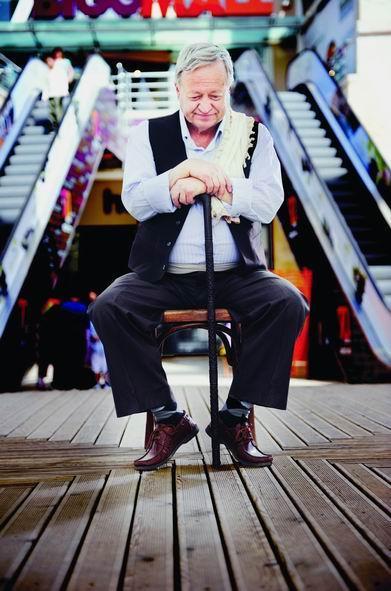'Meddah’ takes a look at storytellers, then and now
Emrah GÜLER

Batur Emin Akyel’s ‘Meddah’ tells the story of an over-the-hill stage actor, Aziz, played by Münir Canar, who has reduced his life to second-rate hotel rooms.
At first glance, the main character in this week’s new release “Meddah” (The Storyteller) is your standard stand-up comedian, albeit without much of the comedy. Taking his place in the shopping malls and coffee houses, Aziz (Münir Canar) recites his one-liners to an audience not so much amused as bemused by the spectacle before them.“The storyteller tells his story with glee to those who have gathered,” tells Aziz to his audience. “Now listen to a story from this humble man, so as not to be unhappy.” Written and directed by Batur Emin Akyel, “Meddah” tells the story of an over-the-hill stage actor who has reduced his life to second-rate hotel rooms.
The only friend Aziz seems to have is the promoter Veli (Tolga Evren) who has taken a liking (or pity) to him, arranging gigs for Aziz. Realizing he doesn’t have that much to live for, Aziz decides to take to the road with a final theater tour. Watching Aziz’s one-man performance, something seems to be off.
It’s not a show people are accustomed to, the pace and rhythm are irregular. There isn’t much of a stage or set or props save a stick and a huge handkerchief. Even the words seem to be from another century. In fact, some of the words are from another century. So are the concept of the show, and the showman.
Aziz is a meddah, the name given to a specific type of storyteller from the Ottoman times. The meddahs would travel to find new audiences where they would improvise stories, changing characters with nothing or just simple props. They would generally be quite skilled in changing the tone of their voice, and their dialects.
The stories would change depending on the reaction from the audience. And more often than not, there would be a moral to these stories. The tradition, in fact, goes back to ancient Greece when traveling storytellers recited epic tales from Homer’s Iliad and Odyssey.
 Who killed the shadow theater?
Who killed the shadow theater?If you are interested in the Ottoman performance arts in Turkish movies, there are two other feature films that revive yet another historic performance; the shadow theater. One of these is director and writer Ezel Akay’s “Hacivat Karagöz Neden Öldürüldü?” (Who Killed Shadows?).
Akay is known to Turkish moviegoers as Ezop, the Turkish translation of Aesop, the Greek storyteller of fables in ancient Greece. A storyteller is the right word for Ezop as he recreates the traditional and modern tales of Turkey in a colorful, unique and inspirational style that has come to be his own.
In his 2006 film, Ezop brought to life the two historic shadow play characters, Hacivat and Karagöz of 14th century Anatolia, just when the small Ottoman tribe was being transformed into a local state on the remains of the falling Eastern Roman Empire. Presumably the very first Turkish stand-up comedians, Karagöz and Hacivat created their unique brand of humor during a tumultuous political period when the decaying Eastern Roman Empire clashed with the Ottomans getting ready to conquer most of the known world.
The film was a unique odyssey into the supposed lives of the two characters that came to have endured centuries of fame as traditional shadow theater of the Ottoman Empire, modern Turkey, Middle East, Greece and the Caucasus.
The film’s first scene featured the shadow play master Salih (Erol Refikoğlu) lending his words to one of his puppets while performing a play for his daughter, “Is it possible to be invisible and good at the same time?” Things were stirred when Greeks officially began surrounding the villages and driving Turks away, Salih and his daughter finding refuge in a neighboring village.
The shadow theater remained as a central motif throughout the film, a reflection of a continuing clash between two nations. “Meddah,” “Hacivat Karagöz Neden Öldürüldü?” and “Gölgeler ve Suretler,” all take these historic performance arts dear to their heart and pay homage to them.
















